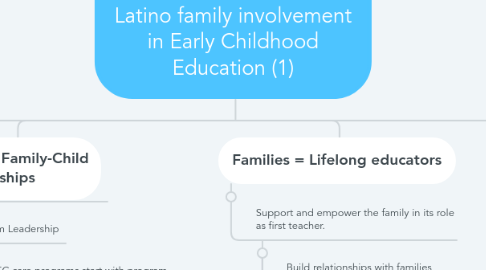
1. Family Well-being
1.1. Family Voice
1.2. Educator Voice
1.3. Impact Areas - 3 R's
1.3.1. Receptive
1.3.2. Responsive
1.3.3. Respectful
2. Positive Family-Child Relationships
2.1. Program Leadership
2.1.1. EC care programs start with program leadership that understands and emphasizes the importance of strong nurturing relationships among:
2.1.1.1. - children
2.1.1.2. - families
2.1.1.3. - educators
2.2. Professional Development
2.2.1. Social and Emotional Foundations for Early Learning (SEFEL)
2.2.1.1. Universal Promotion
2.2.1.2. Secondary Prevention
2.2.1.3. Tertiary Intervention
2.3. Chris Swanson, Ed.D., Senior Director for Quality Care and Education & Associate Research Scientist, Johns Hopkins University, School of Education, Center for Technology in Education
2.3.1. More and more programs are using technology to communicate with all of their families and share ideas and resources. Families feel connected to the program when they receive regular updates, announcements and reminders. By keeping families informed, providers are working to support their families and children.
3. Families = Lifelong educators
3.1. Support and empower the family in its role as first teacher.
3.1.1. Build relationships with families
3.1.2. Provide families with resources and skills
3.1.3. Consistent message
3.1.4. Know them and provide learning opportunities
3.1.5. Professional development to support staff to appropriately engage with families and collaborate with families.
4. Community social capital
4.1. Families = Leaders + Advocates
4.1.1. Families develop more effective parenting skills and habits
